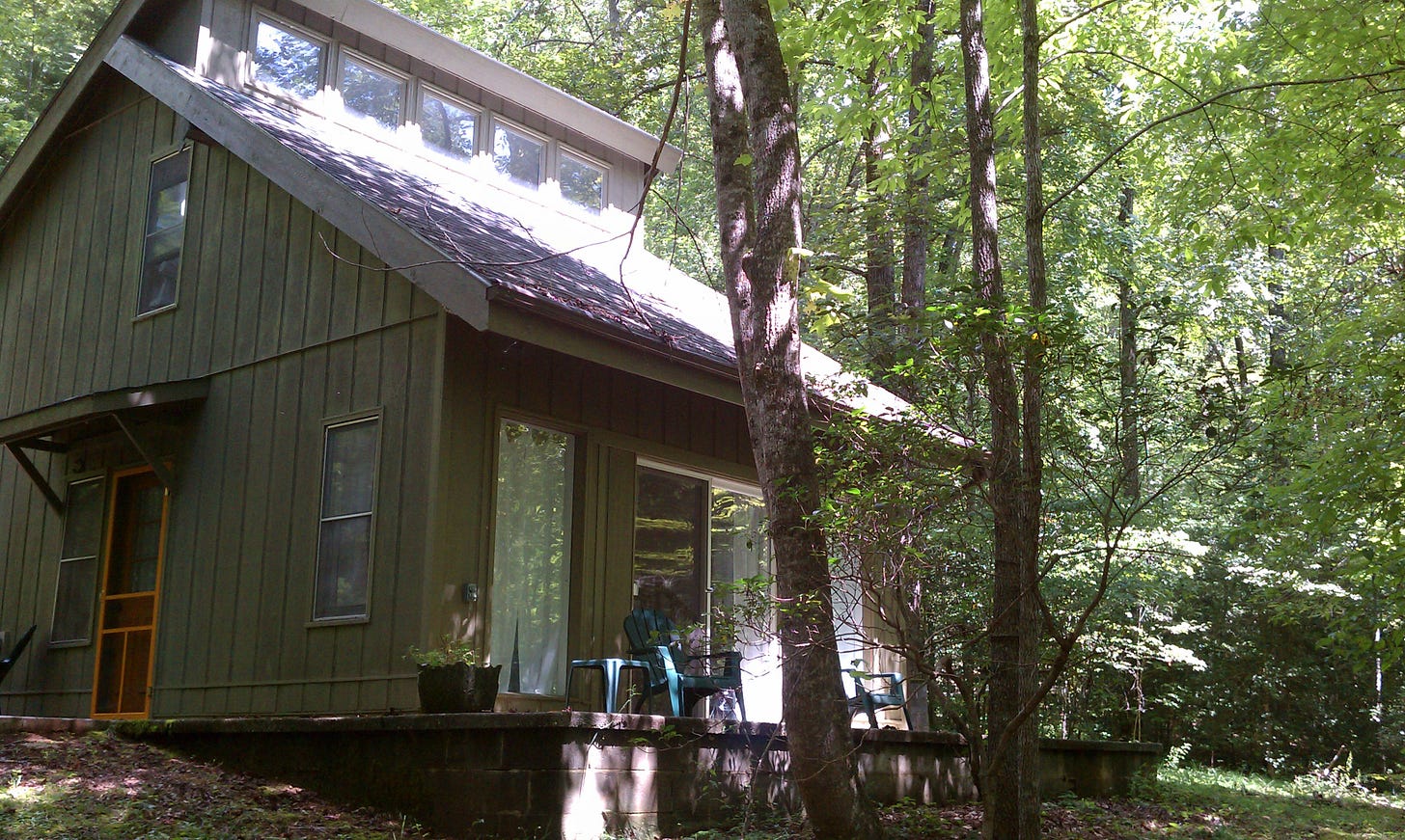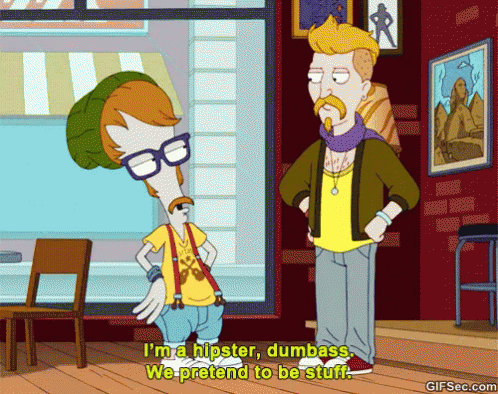This Scene from American Dad! Is Every Writing Residency
American Dad! arrested me with its depiction of the invention process (along with several dumb tropes about poems). But it also raises questions about distraction and creation in isolation.

During a writer’s residency I was offered at the Hambidge Center in northern Georgia this fall, I met a retired ceramicist from the area. She was one of our cohort of eight artists: two writers, a painter, a dancer, a photographer, a singer, and a visual artist. Her gorgeous wood-fired tea bowls and vases left me speechless. I was grateful to be in her orbit, and I loved my time at Hambidge. It’s an incredible place to write and make art.
Near the end of our time together, one of the members unexpectedly had to leave the residency early. The residency director had asked me if I wanted to stay another week in her stead, but I couldn’t. I related this not-very-interesting exchange to my cohort after dinner one evening:
“I would love to stay another week,” I’d said, “but I’ve used up all my remaining time off for the year to come here as it is.”
The ceramicist looked at me sympathetically. Then, without a shred of sarcasm in her voice, she said, “Work gets in the way of so much, doesn’t it?”
I was stunned. Work does get in the way of making art in that it takes up most of your day most days of the week for most people. Undeniably. But the way that the ceramicist was able to locate art-making time as her primary day-to-day concern was enviable to me. Yes, she was speaking from a position of privilege as someone who has been able to retire for many years now. But I haven’t been able to stop thinking about her comment since.
I spluttered up some answer about how I actually enjoy my “day job” (in other words, my career) and feel that it’s central to who I am and to my writing. This felt, and feels, about 75% true. It’s true that I love my work, and it is central to who I am, but what about my other work: my writing? The question I’ve been asking myself for years is how to keep writing in a world where you can’t pay the rent with it.
The fact that I spent two weeks in the Mellinger Studio at Hambidge in the first place tells me that I crave physical and psychological space in which to write. Hambidge and other residencies like it serve thousands of artists every year. The proliferation of the writer’s residency and artist residencies more broadly asks us to think more deeply about the role that solitude, distraction, and paid work play in our creative lives.
What constitutes a “distraction” from writing? And what happens when we have enough time to create without interruption?
The Ridiculous Ham Poem and the Phases of Creation
Enter American Dad!, Seth MacFarlane & company’s long-running adult animated series about a hyper-masculine Republican CIA dad and his family.
Under the creative direction of Mike Barker and Matt Weitzman, the show is at once absurd and realistic, placing dad Stan, mom Francine, kids Steve and Haley—and, oh yeah, attic-dwelling alien Roger—in situations that contain familiar elements of family life set against the zaniest of backdrops.
The silly conceit of the Season 141 episode called “Hamerican Dad!” is that Stan invites Roger into his Ham Club, which is exactly what it sounds like. When one member passes away, Stan sees an opportunity to run for Ham Club President. Bizarrely, Roger suggests that Stand write a “candidacy poem” to announce his intentions. They retreat into a cozy cabin-like environment, complete with fireplace, in order to focus on writing this poem.
This scene makes me laugh. It also gives me a shiver of recognition. Roger and Stan move through the following hilarious and frustrating phases of creation, and when artists are given time to create without distraction, we often fall prey to the same cycle:
Raw, manic creation that occurs without the slightest consideration for quality
Lashing out at perceived distractions, no matter how small
Deep depression (born out of a fear that you have no point of view and are an imposter)
Anger and the desire to destroy things, including your work
Snacking (the realization that your rage might be related to low blood sugar or other mind/body needs rather than failure)
Acceptance of the process and renewed interest in creation
Much like the Kübler-Ross stages of grief, these stages may occur in a different order, repeat themselves, or blend together. Roger and Stan experience all of these in their quest to write Stan’s “candidacy poem” for the Ham Club. The result is… not good! But just like in real life, they can’t all be winners.
But the pair take time out of their “real lives” to try to focus on the creative work they want to do. Their quick vacillation between YES! I’m on a roll and I have nothing is exactly what happens when I and so many other writers have the psychic space in which to focus solely on creation.
The secret is that this cycle is always there and always happening, just in a different time frame. Writing residencies allow for this cycle to happen more quickly, but it’s enough to make you feel majorly out of sorts. In some ways it’s a blessing, but in other ways it’s difficult.
But if unlimited space and time aren’t ideal for writing, what is?
Creating the Conditions for Writing
As I’m writing this, my two cats are play-fighting in a way that feels like it might lead up to a real fight that I will have to break up. Outside, a train whistle penetrates the night and draws my ear. There’s a load of laundry nearby that I need to fold, and at some point, I’ll stop writing when my partner gets home so he and I can spend some time together before we go to bed at a reasonable hour so we can be successful at our full-time jobs.
How much of this is distraction?
The train whistle, sure, and the catfight. But what about the cats themselves? The never-ending dance of the laundry? And the partner? One of the cats has now crawled into my lap and is making it difficult to type. Does he know what I’m thinking?
I wrote a bit about the role of distraction and the impulse to get away from it all in order to write in last week’s post about American Horror Story: Red Tide. And while writing residencies or “we’re moving to Provincetown” pronouncements aim to remove the drudgery of capitalism and even some of the “necessary distractions” of life (preparing meals, for example), we’re still left with the larger questions of what our capital-D Distractions are. We also end up finding or being plagued by new distractions (e.g., the ticking of a tiny clock, Carol).
Even though it’s making me type more slowly, writing with this cat on my lap is one of the deepest pleasures I’ve ever known. And though I usually stop writing once my partner comes home, my relationship with him has filled my life with a kind of joy I thought was reserved for the final frames of romantic comedies.
An environment with all distractions removed isn’t really any way to live. And so like the cycles of inspired creation and worrying that you’re a fraud, maybe seeking solitude in which to write is a cycle itself, waxing and waning as it takes us away from our private distractions and then back to them once we begin to miss the richness that they add to our lives.
Capitalism is a nightmare from which we stubbornly refuse to wake, but until we find a better and more equitable way to live in a society with one another, maybe the best we can do is to think of work as a cat-in-the-lap distraction rather than a train whistle distraction.
Bonus Trope: The Function of Rhyme
Ham, Pam, Ram, Bam, Blam, Shmam… Shmam!
It’s not only that the rhymes Roger comes up with are arbitrary or nonsensical and that the resulting poem is bad: these are just run-of-the-mill jokes about poetry. What interests me is the way that the pair simply starts by searching for words that rhyme with the subject of their poem (ham) and then proceed to write the poem by leaping from one rhyming word to the next.
This approach, if you can call it that, is kind of like leaping from one tenuous foothold to the next while rock-climbing without setting up the foothold after that or surveying the scope of the climb itself.
Again and again in popular culture, we’re offered the idea that rhyming is so key to poetry that a meaningless rhyme is better than no rhyme at all. But the truth is, or rather, the truths are:
Rhyme is optional and is just one of many techniques poets use, and not all rhymes are perfect rhymes like the ones Roger makes.
When we do rhyme, the rhyming words should have a relationship to one another or should ask us to think deeply about what relationship they may have.
Check out this poem, “Au Pair,” by Mary Jo Salter. Here’s the first stanza:
The first thing she’d noticed, as they sat her down for lunch
by the picture window, was flags all doing a dance
in front of houses: was today a holiday?
No, they said smiling, it’s just the American way
and she couldn’t help reflecting that in France
nobody needed reminding they were French,
What relationship do the word “holiday” and the phrase “American way” have here? It’s thought-provoking, and the best poetry makes use of this dimension of rhyme in a way that the cartoon poets of American Dad! simply do not.
P.S.
Hambidge is seriously wonderful. If you’re an artist seeking some time to work with fewer or at least different distractions, consider applying for a residency. I’m very grateful to them for providing me with the space to work on this Substack, my poetry manuscripts, and other hybrid projects.
Padma Lakshmi and Terrance Hayes are over. But I still think we’re one step closer to poets becoming household names.
As ever, Elon Musk doesn’t know what he’s doing. Pundits are reaching to find an explanation for his tweet containing an ancient Chinese poem.
Subscribe to PopPoetry to get weekly explainers, writing prompts, and book reviews centered on poetry, creativity, and pop culture directly to your inbox.
*American Dad! has season number discrepancies between various sites and outlets for reasons that have to do with the show’s transition from FOX to TBS, among other things. You might also find this episode in Season 16, based on the service you’re using.




